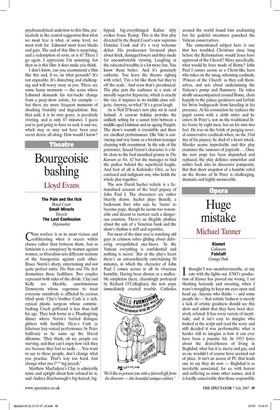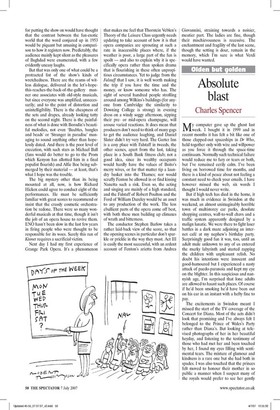Huge mistake
Michael Tanner Kismet Coliseum Falstaff Grange Park T thought I was unembarrassable, at any 1 rate with the lights out. ENO's production of Kismet has proved me wrong. I sat blushing furiously and sweating, when I wasn't struggling to keep my eyes open and head up. Anyone who thinks — and some people do — that artistic badness is merely a lack of artistic goodness should see this show and admit that they have been decisively refuted. It has every variety of ineptitude, and it isn't easy to imagine who looked at the script and read the score and still decided it was performable; what is harder still to imagine is how it can ever have been a popular hit. In 1953 lyrics about the desirableness of living in Baghdad, what fun it is, merry and gay, and so on, wouldn't of course have seemed out of place. It isn't an access of PC that leads one to say they do now — Baghdad is as inevitably associated, for us, with horror and suffering as some other names, and it is hardly conceivable that those responsible for putting the show on would have thought that the contrast between the fun-exotic world that the word conjured up in 1953 would be piquant but amusing in comparison to how it registers now. Predictably, the audience mainly kept silent as the pleasures of Baghdad were enumerated, with a few evidently uneasy laughs.
But that was only one of what could be a protracted list of the show's kinds of wretchedness. There are the reams of witless dialogue, delivered in the let's-hopethis -re aches-the -b ack-of-the-gallery manner one associates with old-style musicals, but since everyone was amplified, unnecessarily; and to the point of distortion and unintelligibility. There is the cheapness of the sets and drapes, already looking tatty on the second night. There is the painfulness of what is done with Borodin's beautiful melodies, not even 'Baubles, bangles and beads' or 'Stranger in paradise' managing to sound anything other than hopelessly dated. And there is the poor level of execution, with such stars as Michael Ball (fans would do better to go to the Prom which Kenyon has allotted him in a final populist flourish) and Alfie Boe being submerged by their material — at least, that's what I hope was the trouble.
The big mystery other than its being mounted at all, now, is how Richard Hickox could agree to conduct eight of the performances. He must be sufficiently familiar with great scores to recommend or insist that the crassly cosmetic orchestration be redone. There were so many wonderful musicals at that time, though it isn't the job of an opera house to revive them. ENO hasn't been slow in the last few years in firing people who were thought to be responsible for its woes. Surely this run of Kismet requires a sacrificial victim.
Next day I had my first experience of Grange Park Opera. It's a phenomenon that makes me feel that Thorstein Veblen's Theory of the Leisure Class urgently needs updating to take account of how it is that opera companies are sprouting at such a rate in inaccessible places where, if the weather is poor, a large part of the fun is spoilt — and also to explain why it is specifically opera rather than spoken drama that is flourishing in these often unpropitious circumstances. Yet to judge from the Falstaff that I saw, it is well worth making the trip if you have the time and the money, or know someone who has. The sight of several hundred people strolling around among Wilkins's buildings (for anyone from Cambridge the similarity to Downing College is strong) in evening dress on a windy soggy afternoon, sipping their preor mid-opera champagne, will arouse varied reactions. It does mean that producers don't need to think of many gags to get the audience laughing, and Daniel Slater didn't try very hard. The Garter Inn is a cosy place with Falstaff in tweeds, the other scenes, apart from the last, taking place in a South Bank fitness club; not a good idea, since its wealthy occupants would hardly have the values of Boito's merry wives, or for that matter tip a laundry basket into the Thames; nor would scruffy Fenton be allowed in or find kissing Nanetta such a risk. Even so, the acting and singing are mainly of a high standard, and the Falstaff of Robert Poulton and the Ford of William Dazeley would be an asset to any production of the work. The less ebullient parts of the opera come off best, with both these men building up climaxes of wrath and bitterness.
The conductor Stephen Barlow takes a rather laid-back view of the score, so that the opening scenes in particular don't sparkle or prickle in the way they must. Act III is easily the most successful, with an ardent account of Fenton's arietta from Andrea Giovannini, straining towards a noisier, meatier part. The ladies are fine, though their mischievousness is recessive. The enchantment and fragility of the last scene, though the setting is dour, remain in the memory, which I'm sure is what Verdi would have wanted.




















































 Previous page
Previous page